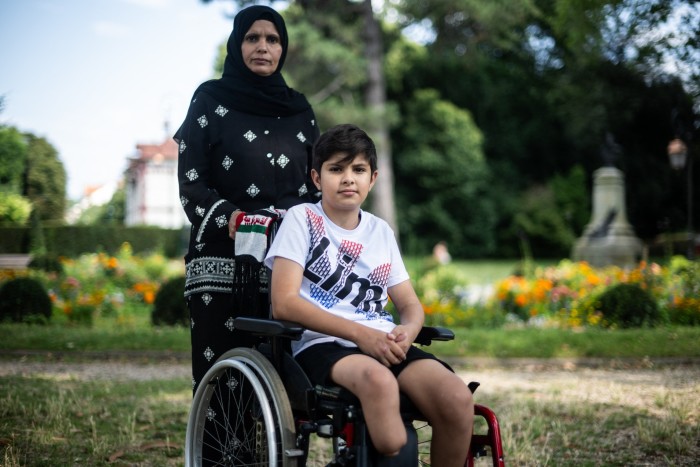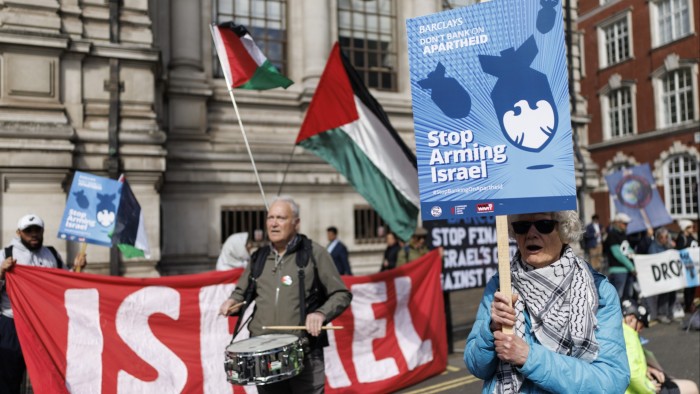Israel eases block on exits from Gaza after Trump urges resettlement

Unlock the Editor’s Digest for free
Roula Khalaf, Editor of the FT, selects her favourite stories in this weekly newsletter.
Israel has allowed hundreds of Palestinians to leave Gaza in recent weeks after months of a near-total block on departures, with exits accelerating after US President Donald Trump in February proposed emptying the Palestinian enclave of its inhabitants.
Trump’s proposal was denounced by the UN, governments and rights groups as tantamount to ethnic cleansing, but was seized on by ministers in Israel’s far-right government, with defence minister Israel Katz announcing in March that Israel would set up a body to facilitate “voluntary” exits and help implement Trump’s plan.
Diplomats said Israel had allowed several hundred people to leave the besieged strip so far this year. France has taken in more than 170, Germany over 70, and numerous other countries have taken in double-digit numbers of people from the enclave.
Israeli officials, including interior minister Moshe Arbel, have sought to portray the exits as part of the “voluntary departure” scheme. But diplomats involved in the process said this was not the case, and that those exiting Gaza now were people they had long been trying to help leave.
Most of those who have left are dual nationals or their dependants, people being evacuated for medical treatment, or people with visas for third countries, diplomats said.
They said those who had left included people whom Israel had previously refused to let out of Gaza, or whose exit had been repeatedly delayed.
“Following Trump’s announcement, Israel decided to open the exit sign again, because in their view . . . it was a way to start implementation of the so-called Trump plan — whereas of course for us it wasn’t,” said one diplomat.
Cogat, the Israeli military body responsible for civil affairs in the Palestinian territories, said it had co-ordinated “dozens” of departures, without giving a precise number. It said that this had been done “in accordance with instructions from the political echelon”.
The Israeli prime minister’s office did not respond to a request for comment.
Departures from Gaza — which are impossible without Israeli approval — all but stopped after Israel seized control of the Rafah border crossing between Gaza and Egypt in May last year, which from the start of the war until then had been the main route out of the enclave.
People involved in the evacuations said they began again in tiny numbers late last year, and approvals accelerated sharply after Trump said in February that the US should take over Gaza, and that “all” 2.1mn people in the enclave should “be resettled”.
Trump’s efforts to persuade Jordan and Egypt to take in Gazans were strongly rebuffed by both countries. But fears of mass displacement have been revived in recent days after Benjamin Netanyahu’s far-right government approved a plan for a further intensification of its 19-month offensive against Hamas in the enclave.
The plan envisages forcing hundreds of thousands of Palestinians into ever smaller tracts of land in Gaza’s south. But a senior Israeli security official said on Monday that their departure from the enclave altogether was also one of the objectives of the intensified offensive.
“The voluntary transfer [emigration] programme for Gaza residents, especially those who will be concentrated in the south outside Hamas control, will be part of the operation’s goals,” the official said.
Diplomats said that it was not yet clear whether Israel would allow those who had left to return. But many of those who left have expressed their determination to do so, despite the dire humanitarian conditions in the enclave, where Israel’s offensive has reduced most buildings to rubble, and its ban on aid has fuelled extreme hunger.
Dunya al-Amal Ismail, a Palestinian poet and writer who left Gaza for France in April, said she had been awarded in 2024 a French government grant to spend a year in Paris working on a writing and teaching project. She applied for the grant before the war, but was only able to travel in April.
Ismail, who was internally displaced in Gaza 11 times during the war, said she would return to the enclave after the end of her grant.
“No one was asked to sign a document to emigrate from Gaza or to stay out for a number of years,” she said. “I would have turned back at the Kerem Shalom crossing if this had been asked of me.”







